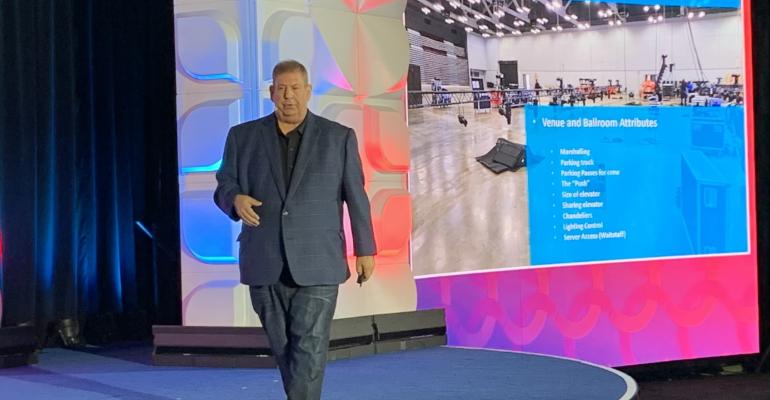Planners: Do not sign venue contracts for event production, electrical services, internet access, and support services until you read the full document—especially if you are bringing in an outside audiovisual company for the event, which usually results in extra conditions and raises prices for certain elements.
That was a central point among the lessons that Scott Frankel, president of Animatic Media, provided during a session at the Connect Springtime Marketplace held April 2 to 4 at the Venetian Resort in Las Vegas. More than 600 event planners attended the educational and supplier-appointment show that’s owned by Informa, the parent company of MeetingsNet.
During his main-stage presentation titled “Mastering Site Inspections for Audiovisual and Production,” Frankel noted that “almost everything is negotiable before you sign the contract. Send it along to your outside audiovisual company and let them red-line it and change some of the proposed terms to make them more favorable for you. They deal with these things all the time.”
Frankel also said that doing a site inspection will help planners understand on-site issues that can affect either costs or production specs (such as low-hanging chandeliers) that the venue’s online brochure does not address. For instance: “How far is ‘the push,’ meaning the distance from the loading dock to the event room? If it is a long distance or the service elevators are small, you might have to pay more for labor than you expected,” said Frankel.
Further, “are load-in and load-out ‘liaisons’ required by the host property to oversee things? If so, make sure you’re only paying for one person, not two or three people.”
Other considerations Frankel presented to planners:
• Let reps from the outside AV company walk the space with you and ask their own questions, because they are the ones who must share their set-up time with the staging team, the carpeting team, and others.
• An outside AV company often must meet “minimum insurance and indemnification requirements” that are not explicitly stated in the contract. Find out what those minimums are before signing and prepare to negotiate them, or they might be too onerous for your outside vendor to meet.
• Ask if outside vendors are allowed to do the electrical and rigging work, or must that be done by the in-house vendor? And can an outside vendor be the one who handles the wireless controls for lighting and production?
• What is the rate for the event space on set-up day, and can it be a half-day charge rather than a full-day charge if set-up requires only a few hours of work? Also, what is the cost of storage rooms for empty boxes and crates that will be needed once the show ends?
• What are the rates for laying protective visqueen on the venue’s floor during load-in and load-out, and what are the technology-related “patch fees” for each meeting room? All of these rates should be negotiated from the original rates in the contract, or else “you could end up paying many thousands of dollars more than you have to,” says Frankel.
For more tips on keeping down audiovisual and production costs at a venue, read this article from MeetingsNet’s sister media outlet, Special Events.





